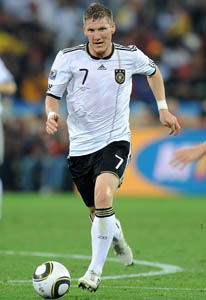It looks set to be the ultimate grudge match. Germany may be threatening Greece with exit from the euro (the official currency of the eurozone), but the debt-stricken country now has an unexpected opportunity for revenge against its biggest and most critical creditor – by knocking its football team out of Euro 2012. After Greece’s surprise win against Russia on Saturday night and Germany’s 2-1 victory over Denmark, the two countries will now face each other in a quarter-final on Friday. Given the tensions, the prospect has filled Greeks with hope that, on the football pitch at least, they will be able to come out on top.
Germany advanced to the European Championship quarter-finals on Sunday evening, beating Denmark 2-1 to complete a perfect three-win record and top Group B. Germany were always favoured to progress from the toughest Euro 2012 group, yet they endured a nervous spell in the second half against the Danes before securing their place in the last eight. Lukas Podolski, playing his 100th international for Germany, scored in the 19th minute, finishing a chance created by Thomas Müller and Mario Gomez. However, Denmark struck back within five minutes, as Michael Krohn-Dehli rose in a crowded goalmouth to nod in Nicklas Bendtner’s headed pass. When Portugal took a 2-1 lead in Kharkiv, a second Danish goal would have been enough to eliminate the heavily fancied Germans. But the Germans maintained control and in the 80th minute substitute Lars Bender scored from a pass into the heart of the Danish penalty area. Everything has gone as planned for Joachim Loew’s side, who have done well to come out of the group of death with maximum points after beating the likes of the Netherlands and Portugal. Their record for this competition looks impeccable taking into account that they won all 10 group games in qualifying for the Euro.
No matter how much Greece’s Portuguese manager, Fernando Santos, appeals for his side to be perceived as more than a just staunch defence, his players go and undermine him with another heroic defensive display. They took their place in the quarter-finals with a 1-0 victory over Russia. Greece skipper Giorgos Karagounis’ goal in first-half injury time was enough to seal the three points and send them through the group stages ahead of their opponents on the head-to-head rule. However, they will be without inspiration Karagounis for this last-eight tie as he was harshly booked for diving, the second unjust suspension they have suffered in this tournament. The Greek’s returning hero was 24-year-old centre-half Sokratis Papastathopoulos, back after being wrongly dismissed against Poland, whose commanding performance belied his youth. His return from suspension ensured an enormous improvement in Greece’s defence and he played a vital part in his side’s win, marshalling the back four and keeping Russia at bay. Despite being solid defensively Greece have scored against every team they’ve played in the tournament. They qualified for the Euro by finishing top of their six team qualifying group, ahead of Croatia and Israel. They went unbeaten winning seven matches, drawing three and conceding just five goals. However, they were the lowest scoring team of all the group winners.
The Greek players are aware that a good run in the competition in Poland and Ukraine will help alleviate some of their compatriots’ current woes. In economic terms, Germany and Greece are poles apart. One is Europe’s leading economy with considerable global clout while the other is in its fifth year of recession and crippled by political and financial uncertainty.
In football, there are some parallels.
The celebrated German team have the European championships’ best record, having lifted the trophy and been runners-up three times each.
Greece, however, have only qualified for the finals four times, although they won it once in 2004.
Germany have won the World Cup no fewer than three times and been runners-up on four occasions, with four third-place finishes. Their 12 top-four finishes outshines even that of five-times winners Brazil.
Greece for its part only qualified for their first finals in 1994 and made their second appearance two years ago, but on both occasions crashed out at the group stage.
German league clubs have won the old European Cup and now Champions League six times and been runners-up on nine occasions.
Bayern Munich have won the competition four times — a feat only bettered by Real Madrid (nine), AC Milan (seven) and Liverpool (five) — while Hamburg and Borussia Dortmund have each won it once.
To date, Panathinaikos are the only Greek team to have reached a final. In 1971, they lost 2-1 to Ajax.
Germany’s Bundesliga, meanwhile, is on an increasingly sound financial footing.
Revenue grew by five percent in the 2010-11 season to 1.7 billion euros (1.4 billion pounds, $2.1 billion) — second only to the English Premier League, which saw 12 percent growth to 2.5 billion in the same period, Deloitte Sports Business said.
The German league even outstripped the Premier League in terms of operating profits (171 million euros versus 75 million euros in 2010-11), the auditors said in their “Annual Review of Football Finance 2012”, published in May.
In addition, average attendances of 42,100 at German grounds in the season before last were the best in Europe, the report said.
Greek domestic football — effectively an annual three-way battle between Olympiakos, Panathinaikos and AEK Athens — has in contrast been hit in recent years by high-profile match-fixing claims, dwindling crowds as well as fan violence.
The cash-strapped nation are relishing being underdogs again — after they won the tournament against all the odds in 2004. However, Germany will present a much sterner test than Greece have faced so far. The Germans will stick to their game and cruise to the semi-finals.









